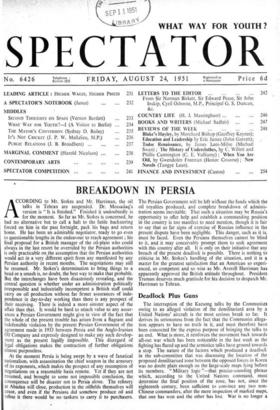BREAKDOWN IN PERSIA
ACCORDING to Mr. Stokes and Mr. Harriman, the oil talks in Tehran are suspended. Dr. Mossadaq's version is " It is finished." Finished it undoubtedly is for the moment. So far as Mr. Stokes is concerned, he had no alternative but to call a halt to the futile huckstering forced on him in the past fortnight, pack. his bags and return home. He has been an admirable negotiator, ready to go even to questionable lengths in the endeavour to reach agreement ; his final proposal for a British manager .of the oil-plant who could always in the last resort be overruled by the Persian authorities. is only practicable on the assumption that the Persian authorities would act in a very different spirit from any manifested by any Persian authority in recent months. The negotiations may still be resumed. Mr. Stokes's determination to bring things to a head or a smash is, no doubt, the best way to make that probable. But the interchanges have been disastrously revealing, and the central question is whether under an administration politically irresponsible and industrially incompetent a British staff could carry on oil production without far firmer assurances of inde- pendence in day-to-day working than there is any prospect of their receiving. There' is indeed a more sinister aspect of the affair than that. It would be hard to attach value to any assur- ances a Persian Government might give in view of the fact that the whole of the present trouble has arisen from a flagrant and indefensible violation by the present Persian Government of the agreement made in 1933 between Persia and the Anglo-Iranian Oil Company and expressly designed to make any such develop- ment as the present legally impossible. This disregard of legal obligations makes the contraction of further obligations almost purposeless.
At the moment Persia is being swept by a wave of fanatical nationalism, with assassination the chief weapon in the armoury of its exponents,.which makes the prospect of any resumption of negotiations on a reasonable basis remote. Yet if they are not resumed, and brought to some not impossible conclusion, the, consequence will be disaster not to Persia alone. The refinery at Abadan will close, production in the oilfields themselves will cease, and even if the Persians did somehow produce oil and refine it there would be no-tankers to carry it to purchasers.. The Persian Government will be left without the funds which the oil royalties produced, and complete breakdown of adminis- tration seems inevitable. That such a situation may be Russia's opportunity to offer help and establish a commanding position in the country is too manifest to need mention, though it is fair to say that so far signs of exercise of Russian influence in the present dispute have been negligible. This danger, such as it is. must be faced. Even the Persians themselves cannot be blind to it, and it may conceivably prompt them to seek agreement with this country after all. It is only on their initiative that any breach of the present deadlock is possible. There is nothing to criticise in Mr. Stokes's handling of the situation, and it is a, matter for the greatest satisfaction that an American so experi- enced, so competent and so wise as Mr. Averell Harriman has apparently approved the British attitude throughout. President Truman deserves much gratitude for his decision to despatch Mr. Harriman to Tehran.






























